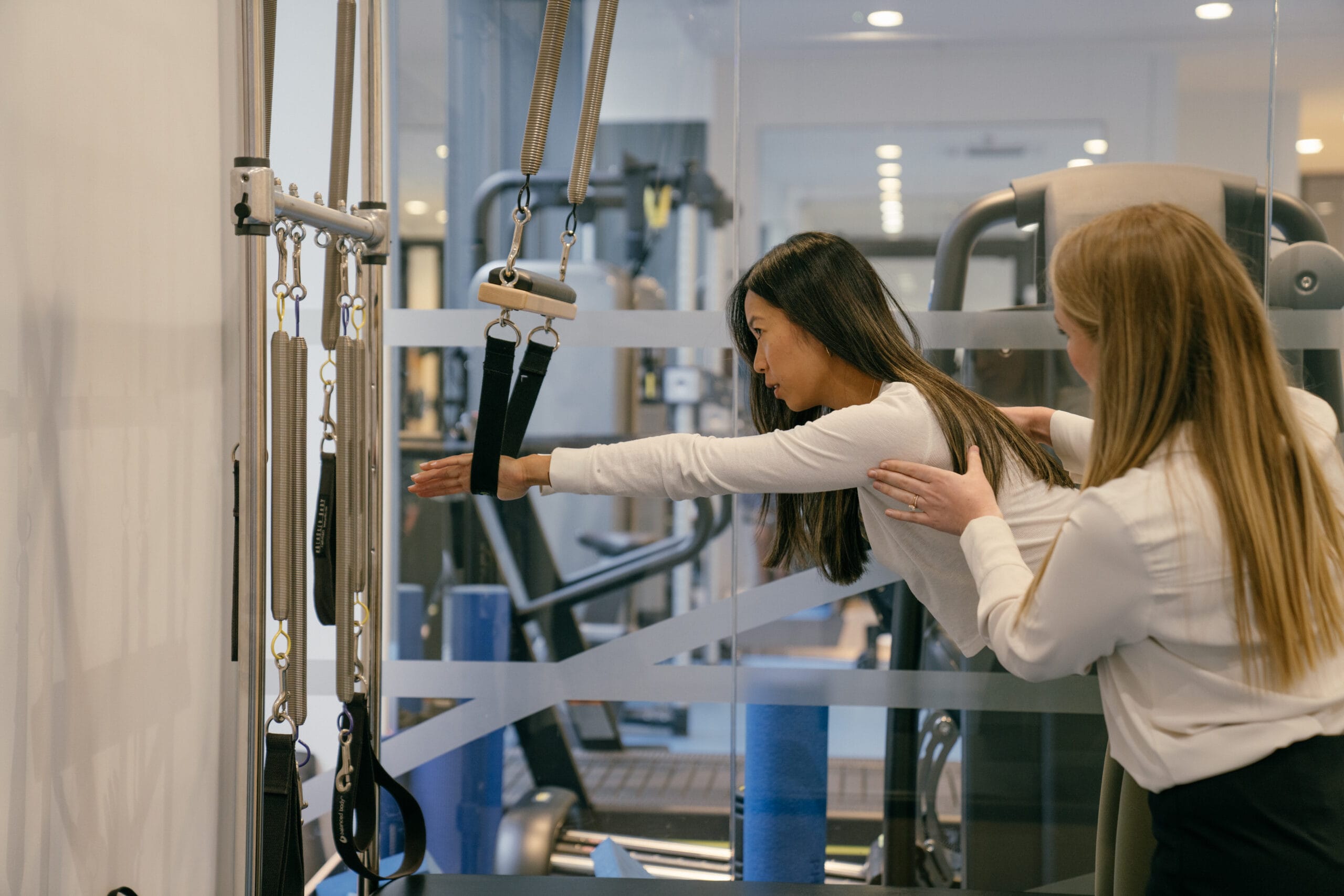The Role of Nutrition in Managing Early Perimenopause Symptoms

Dr Linia Patel
Women’s Health Dietitian & Performance Nutritionist
- 23 October, 2025
- No Tags
- 6 min read
The Role of Nutrition in Managing Early Perimenopause Symptoms
Perimenopause is a natural stage of every woman’s life — but how and when it unfolds can feel very different. For some, the transition starts earlier than expected, bringing subtle yet disruptive changes to the body and mind.
These shifts can leave you feeling a little off-balance — but recognising what’s happening and knowing how nutrition and lifestyle can support you makes a world of difference. Left unchecked, menopause is linked to higher risks of obesity, metabolic syndrome, cardiovascular disease, and osteoporosis — but proactive choices can make a profound difference and set you up for long-term health.
At Pure Sports Medicine, our multidisciplinary team of Physiotherapists, Women’s Health Specialists, and Nutritionists help women navigate every stage of perimenopause. In this article, we’ll explore what early perimenopause looks like, why it may happen sooner than you expect, and how tailored nutrition and lifestyle strategies can ease the journey.

Identifying Early Perimenopause
Perimenopause is the stage before menopause when your hormone levels, particularly oestrogen and progesterone show an overall downward trend. The average onset is mid to late 40s, but some women notice early signs of perimenopause well before then.
Some women in their early 30s experience symptoms, although this is less common. More often, changes begin in the mid-to-late 40s. Genetics, medical history, and lifestyle factors all influence the timing. In general, any noticeable hormonal symptoms or menstrual changes before age 45 may fall into the category of early perimenopause.
Whilst symptoms are individual, early perimenopause symptoms may include disrupted sleep, cognitive changes and irregular or shortened periods. Late perimenopause symptoms can include menstrual cycles that become more widely spaced, hot flushes and night sweats.
Common Early Signs and Symptoms
As we outlined at the start of the article, every woman’s experience of perimenopause is unique, but certain early-stage perimenopause symptoms are widespread.
- Mood changes: Irritability, low mood, or heightened anxiety can accompany hormonal shifts, especially when combined with sleep disturbances.
- Fatigue and brain fog: Energy dips and difficulty concentrating are frequently reported.
- Weight gain: Declining oestrogen reduces insulin sensitivity, making weight gain, particularly around the midsection, more likely. A study has found that 20% of women gain over 4.5kg during perimenopause.
- Hot flushes and night sweats: Another hallmark of perimenopause, where sudden waves of heat and disrupted sleep can appear. This can be paired with joint pains, which can become more frequent. However, regular exercise has been shown to improve the tolerability of hot flushes by 30%.
For women in their 40s, these symptoms can feel amplified by the realities of daily life. Careers, teenagers at home, and caring for ageing parents, otherwise known as “the sandwich generation,” often collide with perimenopausal changes, adding extra layers of stress and exhaustion.
Understanding the underlying early perimenopause causes is essential. Although genetics and health history can influence timing, lifestyle factors matter too. Ongoing research suggests a link between extreme stress, particularly PTSD and an increased risk of early menopause, though more studies are needed to confirm this.

The Role of Nutrition
Perimenopause is unavoidable, but your experience of it is highly personal, and nutrition and hydration play powerful roles. Eating well can ease perimenopause symptoms, protect your long-term health, and reduce your risk of conditions like diabetes and heart disease and support healthy bones as you age.
Here are some of the key elements to focus on:
1. Hydration
If there’s one habit that quietly supports almost every aspect of wellbeing, it is this. Staying hydrated influences how efficiently your metabolism runs, how well your appetite is regulated, your energy levels throughout the day, and even the quality of your sleep. Ignore it, and every other strategy becomes harder to sustain.
2. Eat to support gut health
Fermented foods like kefir and kimchi can support digestion and remain key to nourishing gut health, a foundation of menopause nutrition. Whole grains also support brain function and energy production. Aim for 30–45g daily from sources like oats, brown rice, quinoa, bulgur, and wholegrain bread or pasta. Add beans and legumes into the mix as well.
3. Eat to manage blood glucose control
Hormonal changes can accelerate the loss of muscle mass, making protein crucial for preservation and strength. Include lean meats, 2–3 servings of fish weekly, beans, lentils, chickpeas, tofu, eggs and nuts. Combined with resistance training, protein can help protect your muscles, protect skeletal muscle and keep you feeling fuller for longer.
4. Eat to beat inflammation
Packed with vitamins, minerals, and antioxidants, fruits and vegetables reduce inflammation and support hormone balance. Focus on a colourful variety: berries, citrus, leafy greens, and cruciferous vegetables like broccoli and cauliflower. Aim for five portions daily (roughly 3–4 servings of vegetables and 1–2 servings of fruit).
Anti-inflammatory and heart-protective, omega-3s from food sources may also ease mood-related symptoms. Include salmon, mackerel, chia seeds, walnuts and ground flaxseeds, regularly.
5. Eat to support your bone health
Calcium and vitamin D are vital for bone health, as declining oestrogen levels can increase your risk of osteoporosis. Include dairy (milk, yoghurt, cheese) or fortified alternatives such as soy products in your diet. Leafy greens, almonds, and oily fish are excellent sources too! However, if you avoid dairy, it’s worth speaking with a Nutritionist to tailor your intake.
Foods to Limit
Certain foods and drinks can make symptoms worse. Cutting back may noticeably improve your wellbeing. These include the following:
- Alcohol: Alcohol is inflammatory for the gut and disrupts your microbiome. Interestingly, research also shows that alcohol can raise oestrogen levels in the short and long term and one of the ways it is thought to do this is by negatively impacting the microbiome. This doesn’t mean you have to become a tee-total; however, if you are struggling with your gut or your hormones alcohol is a big one to watch.
- Caffeine: A recent study of 2,507 menopausal women found that those with higher caffeine intake were more likely to experience hot flushes and night sweats. On the other hand, they reported fewer issues with mood, memory, and concentration. It’s important to remember that everyone responds differently to caffeine, depending on your genetic makeup. If you don’t tolerate caffeine well and are struggling with hot flushes, consider cutting back. if you do choose to enjoy it, try to have your last caffeinated drink no later than 2pm.
- Sugar: Spikes insulin and cortisol can worsen fatigue and mood swings. Stick to 30g of added sugar a day or less.
- Salt: Excess sodium raises blood pressure and increases bloating. To help counteract this, keep your water intake high and include plenty of vegetables in your diet.
Being mindful of these triggers doesn’t mean cutting everything out, but reducing intake can make a noticeable difference.
At Pure Sports Medicine, our Dietitians and Nutritionists create tailored plans to help women manage irregular cycles, weight changes, or busy lifestyles while supporting perimenopause health.

Lifestyle Factors Beyond Nutrition
Nutrition is at the heart of perimenopause management, but it is most effective when complemented with other lifestyle changes.
- Stress management: Stress can cause early perimenopause symptoms to worsen and can disrupt your hormonal balance. Embracing relaxation techniques such as mindfulness, yoga and Pilates, deep breathing exercises, or meditation can help regulate your body’s responses.
- Regular exercise: Exercise and movement are vital for bone strength, cardiovascular health, and mood regulation. Pure Sports Medicine’s Physiotherapy and Strength and Conditioning services create tailored programmes that help women stay strong and mobile through perimenopause.
- Sleep routines: Sleep disruptions are common in early perimenopause, but small changes can improve rest. Try keeping a consistent bedtime, reducing caffeine in the afternoon, limiting screen use at night, and creating a calming bedtime routine.
- Pelvic health: Hormonal changes can affect pelvic health, sometimes leading to discomfort, bladder issues, or changes in overall core stability. Our Women’s Health Physiotherapists at Pure Sports Medicine provide expert guidance to strengthen the pelvic floor and improve confidence in daily movement
When To Seek Support
Many perimenopause symptoms can be managed through lifestyle and nutrition. These can include:
- Weight gain
- Digestive health
- Low and/or poor energy
- Change in mood and concentration
At Pure Sports Medicine, our multidisciplinary team, featuring Nutritionists, Physiotherapists, and Consultants, will work together to give you holistic, tailored care. This means you can address both the physical and emotional aspects of perimenopause in one place.

Take Control of Your Perimenopause Journey
Experiencing symptoms earlier than expected can feel unsettling, even overwhelming. By nourishing your body with nutrient-rich foods, staying active, managing stress, and seeking professional support, you can ease discomfort while also protecting your long-term health.
Most importantly, you don’t have to navigate perimenopause alone. With guidance from our Women’s Health Specialists, you can approach this transition with clarity, confidence, and a renewed sense of control.
At Pure Sports Medicine, we’re here to ensure you feel supported, informed, and empowered. To learn more about how nutrition and lifestyle strategies can help you manage symptoms and thrive through this stage of life, book a consultation with our team today.

Advice
Over the last 20+ years our experts have helped more than 100,000 patients, but we don’t stop there. We also like to share our knowledge and insight to help people lead healthier lives, and here you will find our extensive library of advice on a variety of topics to help you do the same.
OUR ADVICE HUBS See all Advice Hubs

